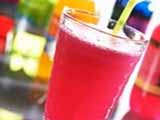|
|
TODAY.AZ / Weird / Interesting
American study: fizzy drinks can increase chance of stroke
26 May 2010 [11:32] - TODAY.AZ
Fizzy drinks can increase the chance of a stroke, scientists claim.
 Drinking two fewer glasses of soft drinks could reduce the risk of dying of a stroke by eight per cent and coronary heart disease by five per cent, an American study revealed. Drinks laced with sugars has long been linked to a greater risk of obesity and diabetes but the effect of the sweet beverages on blood pressure had been uncertain.
Drinking two fewer glasses of soft drinks could reduce the risk of dying of a stroke by eight per cent and coronary heart disease by five per cent, an American study revealed. Drinks laced with sugars has long been linked to a greater risk of obesity and diabetes but the effect of the sweet beverages on blood pressure had been uncertain."Our findings suggest that reducing sugar-sweetened beverages and sugar consumption may be an important dietary strategy to lower blood pressure and further reduce other blood pressure-related diseases,
"It has been estimated that a 3-millimetres of mercury (mm Hg) reduction in systolic blood pressure should reduce stroke mortality by 8 percent and coronary heart disease mortality by 5 percent.
"Such reductions in systolic blood pressure would be anticipated by reducing sugar-sweetened beverages consumption by an average of 2 servings per day."
Researchers sampled 810 adults aged between 25 and 79 with a prehypertension of between 120/80 and 139/89 mm Hg and stage I hypertension of between 140/90 and 159/99 mm Hg. Over 18 months the study look at weight loss, exercise, and a healthy diet as a means to prevent and control high blood pressure.
At the start each drank on average 10.5 fluid ounces of sugary drinks - equivalent to one glass. Art the end they drank the equivalent of half a glass and both systolic blood pressure - the pressure when the heart beats - and diastolic blood pressure - the pressure between beats - had declined significantly.
After controlling for known risk factors of blood pressure, the analysis found that a reduction of one serving per day of the sugary drink saw a 1.8 millimetres of mercury (mm Hg) drop in systolic pressure and a 1.1 mm Hg decline in diastolic pressure over 18 months.
Weight loss was a factor but the change in blood pressure was statistically significant.
Dr Chen added: "Although this study was conducted among mostly overweight adults and many with hypertension, webelieve that others will benefit by reducing the consumption of sugar-sweetened beverages.
"However, such evidence from humans is lacking, and we plan to conduct such research among non-hypertensive individuals."
The findings were published in Circulation: Journal of the American Heart Association.
/Telegraph.co.uk/
URL: http://www.today.az/news/interesting/68696.html
 Print version
Print version
Views: 3207
Connect with us. Get latest news and updates.
See Also
- 19 February 2025 [22:20]
Visa and Mastercard can return to Russia, but with restrictions - 05 February 2025 [19:41]
Japan plans to negotiate with Trump to increase LNG imports from United States - 23 January 2025 [23:20]
Dubai once again named cleanest city in the world - 06 December 2024 [22:20]
Are scented candles harmful to health? - 23 November 2024 [14:11]
Magnitude 4.5 earthquake hits Azerbaijan's Lachin - 20 November 2024 [23:30]
Launch vehicle with prototype of Starship made its sixth test flight - 27 October 2024 [09:00]
Fuel prices expected to rise in Sweden - 24 October 2024 [19:14]
Turkiye strikes terror targets in Iraq and Syria - 23 October 2024 [23:46]
Kazakhstan supplied almost entire volume of oil planned for 2024 to Germany in 9 months - 23 October 2024 [22:17]
Taiwan reported passage of Chinese Navy aircraft carrier near island
Most Popular
 Algeria expels 12 French diplomats amid rising diplomatic tensions
Algeria expels 12 French diplomats amid rising diplomatic tensions
 Azerbaijan discusses co-op & regional stability with Syrian Transitional Government
Azerbaijan discusses co-op & regional stability with Syrian Transitional Government
 Macron's Monday: scandal again, sent again
Macron's Monday: scandal again, sent again
 Azerbaijan, Qatar explore prospects for expanded healthcare cooperation
Azerbaijan, Qatar explore prospects for expanded healthcare cooperation
 Robert Kocharyan's promotion of ethnic hatred against Azerbaijanis exposed
Robert Kocharyan's promotion of ethnic hatred against Azerbaijanis exposed
 President approves partnership agreement on digital economy within OTS members
President approves partnership agreement on digital economy within OTS members
 Accused French spy Martin Ryan claims his ties were ‘personal’
Accused French spy Martin Ryan claims his ties were ‘personal’
